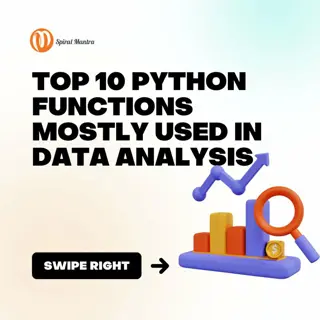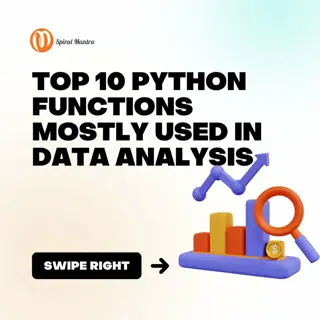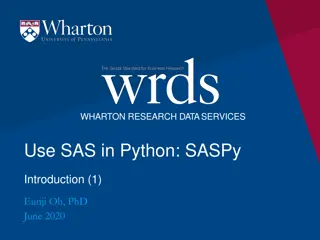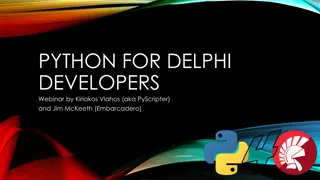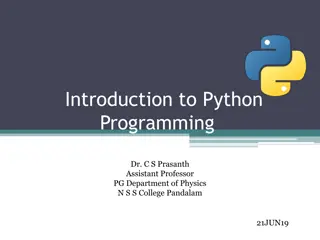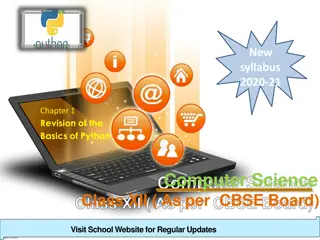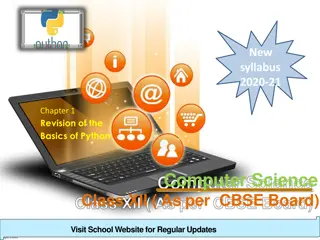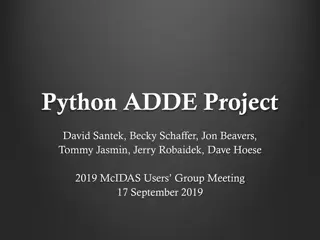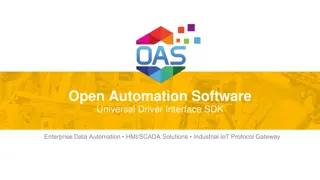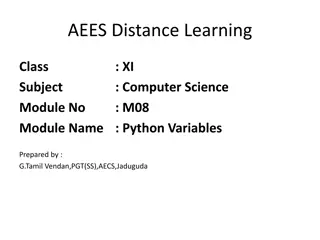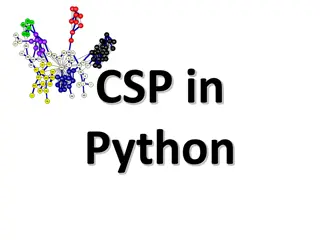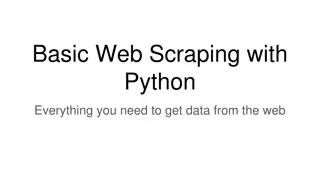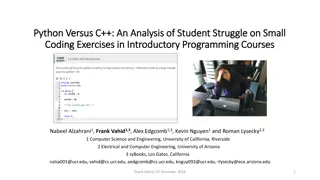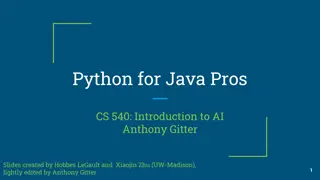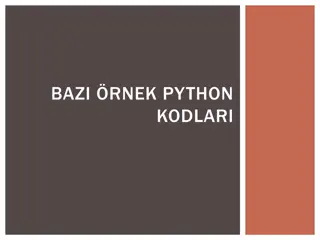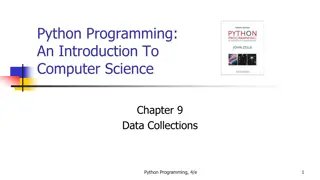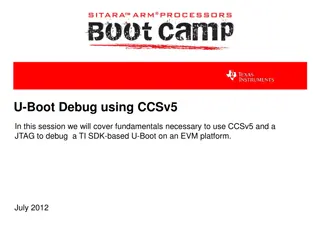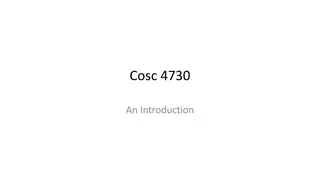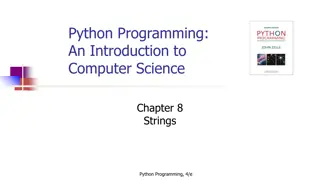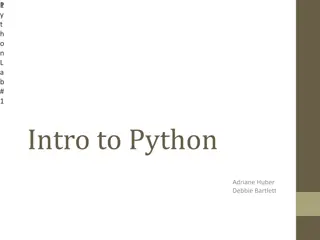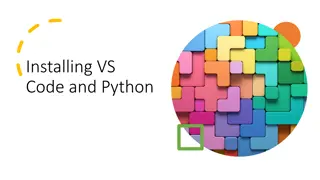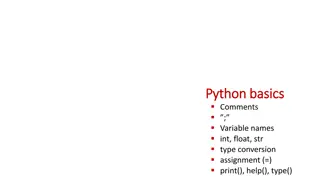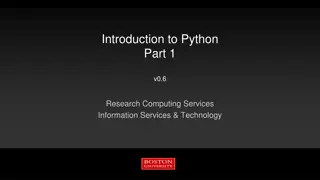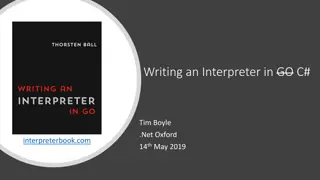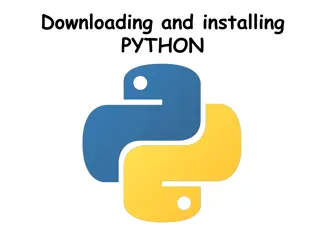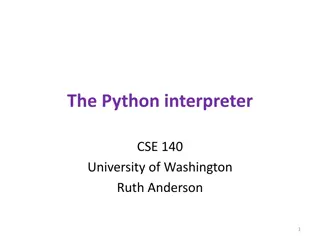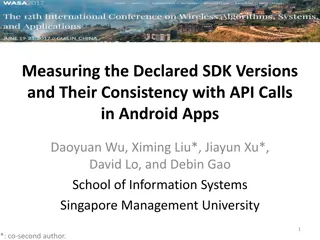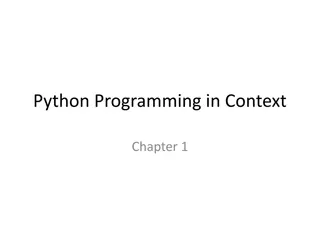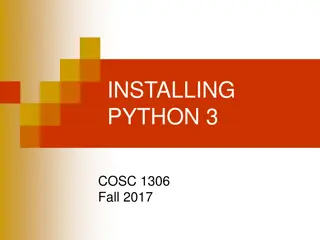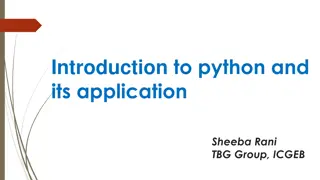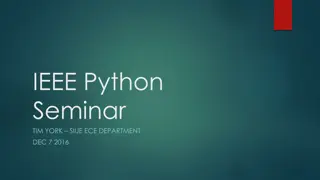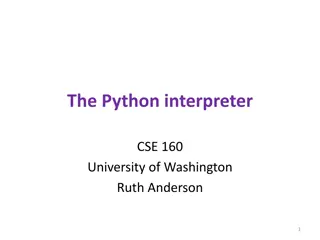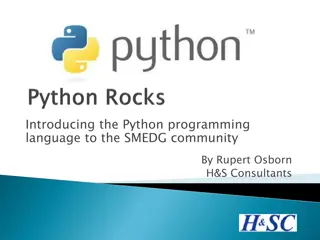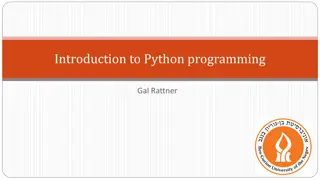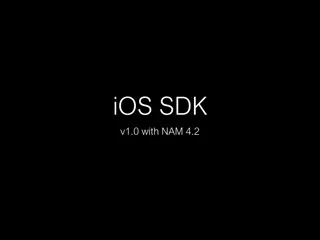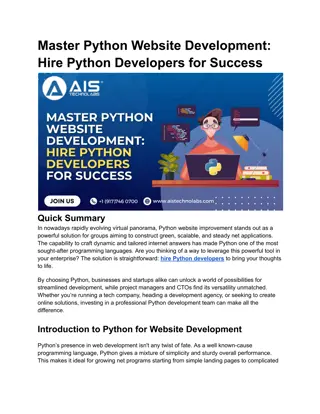Top 10 Python Functions
\nEmbark on a journey through Python's programming landscape with our curated selection of the \"Top 10 Python Functions.\" Dive into the versatility of these functions, from slicing and dicing strings to gracefully traversing complex data structures. Master Python's toolkit and revolutionize your c
5 views • 7 slides
Top 10 Python Functions
\nEmbark on a journey through Python's programming landscape with our curated selection of the \"Top 10 Python Functions.\" Dive into the versatility of these functions, from slicing and dicing strings to gracefully traversing complex data structures. Master Python's toolkit and revolutionize your c
2 views • 7 slides
Introduction to SASPy: Using SAS in Python
Learn about SASPy, a Python API to the SAS system that allows for seamless interaction between SAS and Python environments. Explore how to start a SAS session, exchange data between SAS datasets and Pandas data frames, and utilize various useful methods. Discover the benefits of incorporating SASPy
1 views • 11 slides
Python for Delphi Developers Webinar Overview
This webinar provides insights into the growing popularity of Python for Delphi developers. It showcases the potential synergies between Python and Delphi, highlighting the advantages and opportunities for developers in integrating these two languages. The session covers accessing Python libraries f
2 views • 23 slides
Introduction to Python Programming at N.S.S. College: A Brief Overview
Python is a high-level programming language known for being open-source and community-driven. Developed by Guido van Rossum in the late 1980s, Python has evolved over the years to become a versatile language with a rich history. This overview touches upon Python's key features, timeline/history, and
1 views • 42 slides
Overview of Python Programming for Class XII Computer Science
This chapter provides a comprehensive revision of the basics of Python programming for Computer Science students in Class XII as per the CBSE Board syllabus. It covers the introduction, features, shortcomings, and practical aspects of working in Python, including interactive mode and script mode. Th
2 views • 61 slides
Basics of Python for Class XII Computer Science - CBSE Board
Comprehensive overview of Python programming language covering its introduction, features, shortcomings, and how to work in Python interactive and script mode. The content also emphasizes the importance of Python in software development, web development, system scripting, and mathematics alongside p
1 views • 61 slides
Revolutionizing Data Delivery with Python ADDE Project
Python ADDE Project aims to modernize data delivery infrastructure by developing Python libraries for ADDE server development, enabling easy creation of servers without the need for McIDAS-X knowledge. The initiative seeks to ensure a sustainable future for ADDE in serving new satellite and image da
4 views • 9 slides
Universal Driver Interface SDK for Industrial IoT Connectivity
The Universal Driver Interface (UDI) SDK by Open Automation Software empowers developers to create custom communication drivers for the OAS IIoT Framework. With flexible networking options, remote connectivity, and support for multiple operating systems, UDI opens up a world of possibilities for sea
3 views • 8 slides
Python Variables: Understanding Declaration, Naming Rules, and Assignment Operators
Python variables are essential for storing values in reserved memory locations. This article covers the basics of variables in Python, including declaration, assigning values, naming rules, multiple assignments, deleting variables, and assignment operators. Learn how to create, name, and manipulate
2 views • 11 slides
Object-Oriented Programming (OOP) in Python
Python is a versatile programming language that supports various programming approaches. Object-Oriented Programming (OOP) is a popular method in Python where objects are created to solve programming problems. OOP in Python focuses on creating reusable code, following the principle of DRY (Don't Rep
2 views • 35 slides
Solving CSP Problems in Python with python-constraint Package
Overview of how to install and use the python-constraint package for solving Constraint Satisfaction Problems (CSP) in Python. Includes installation instructions, simple examples, and applying constraints for solving problems like Magic Squares.
0 views • 21 slides
Mastering Web Scraping with Python
Learn the essentials of web scraping using Python to extract data efficiently. Python's versatility shines in web programming and data management, allowing for a seamless research pipeline. Explore different approaches to web scraping in Python and understand the importance of managing data effectiv
9 views • 19 slides
Comparative Analysis of Student Struggle in Python vs. C++ for Small Coding Exercises
An analysis conducted by Nabeel Alzahrani, Frank Vahid, Alex Edgcomb, Kevin Nguyen, and Roman Lysecky compared student struggles in Python and C++ for small coding exercises in introductory programming courses. The study explored the ease of learning Python compared to C++ and the demand for Python
2 views • 17 slides
Introduction to Python for Java Professionals
Explore the transition from Java to Python with key differences, advantages of Python, suitable environments for coding, and a comparison of basic program structures between the two languages. Discover why Python is preferred for machine learning projects and where to write and run Python code onlin
3 views • 15 slides
Introduction to Basic Python Datatypes & Software Development
Explore the fundamental concepts of Python programming, including basic datatypes such as integers, floats, and booleans. Learn about software development, Python scripts, printing messages, user inputs, and more. Get started with Python using online IDEs like repl.it and delve into writing your fir
2 views • 29 slides
Python Coding Examples for Beginners
Explore various Python coding examples including calculating Fibonacci numbers, manipulating arrays, implementing Euclid's algorithm, finding prime numbers, and solving list difference problems. The examples cover a range of fundamental Python concepts and are accompanied by explanations to help beg
1 views • 18 slides
Introduction to Data Collections in Python Programming
In this introduction to computer science chapter, you will explore the use of lists, tuples, and dictionaries in Python to represent and manipulate collections of data. Learn about the functions and methods available for working with Python lists and understand how to group related values using tupl
1 views • 58 slides
U-Boot Debug Using CCSv5 - Fundamentals and Examples
This session covers the essentials of using CCSv5 and a JTAG to debug a TI SDK-based U-Boot on an EVM platform. It includes pre-work checklist, agenda, background information, components of Sitara Linux SDK, where to get the SDK, CCS installation details, and example development environment for AM33
2 views • 34 slides
Google Fit SDK and Responsible Data Usage
Google Fit SDK provides developers with tools to easily access sensor data sources and manage users' fitness history. It emphasizes responsible data usage, requiring clear user consent and adherence to specific guidelines. The platform offers an open ecosystem for storing and accessing fitness data
0 views • 44 slides
Ultimate Guide to Setting Up Android Studio and SDK
Step-by-step instructions on installing Java, Android Studio, and SDK for Windows and Linux systems. Learn how to customize setup, install Java SE SDK, manage SDK versions, and configure signing keys. Explore features of Android Studio and tips for optimizing SDK tools. Understand the difference bet
3 views • 35 slides
Introduction to Python Strings and Basic Operations
Python Programming introduces the string data type, representing text in programs as a sequence of characters enclosed in quotation marks. This chapter covers operations on strings using built-in functions and methods, sequences and indexing in Python strings and lists, string formatting, cryptograp
1 views • 67 slides
Introduction to Python: Explore Python Labs
In this Python Lab series, delve into the fundamentals of Python programming. Discover the origins of Python, its unique features, and how to create and run Python scripts. Engage in hands-on assignments to enhance your Python skills, including experimenting with print statements, loops, and more.
0 views • 5 slides
Guide to Installing VS Code and Python
Learn how to install Visual Studio Code (VS Code) and Python on Mac and Windows step-by-step. Get insights on setting up Python interpreter, activating Python in VS Code, and validating the installation process to start coding effortlessly.
0 views • 8 slides
Python Basics: Comments, Variable Names, Assignments, and More
Learn about the basics of Python programming, including the use of comments to explain code, defining variable names, type conversion, assignment operators, and general guidelines for coding practices. Explore how to effectively use comments to describe code functionality and understand the signific
0 views • 21 slides
Python Tutorial and Resources for Research Computing Services
Explore Python tutorial resources and services offered by Research Computing Services for scientific programmers, data analysis, visualization, and more. Learn how to access Python for tutorials and installation instructions. Get started with Python for research computing today!
1 views • 64 slides
Developing an Interpreter Using GO and C# with Roslyn SDK
Exploring the process of creating an interpreter in GO and C# with the help of the Roslyn SDK, focusing on templates, syntax visualization, building a simple interpreter, and implementing code fixes and analyzers. The journey covers essential aspects such as the Roslyn SDK, template utilization, and
2 views • 62 slides
Guide to Downloading and Installing Python for Beginners
Get started with Python by following this comprehensive guide that covers downloading, installing Python on different operating systems, setting up development tools, launching IDLE, and running your first Python program. Created by Nouf Almunyif.
0 views • 20 slides
The Python Interpreter and Running Python Programs
The Python interpreter in CSE 140 at the University of Washington, explained in detail with images. Learn how to run Python using the interpreter, launch it through IDLE, and understand the differences between running Python code in the interpreter and as a program.
2 views • 7 slides
Analyzing Declared SDK Versions' Consistency with API Calls in Android Apps
Understanding the importance of Declared SDK (DSDK) versions in Android apps and their impact on API calls. Exploring the potential side effects of incorrect SDK version declarations and the need for developers to adhere to proper SDK versioning practices for compatibility and security. Delve into e
1 views • 24 slides
Introduction to Python Programming in Context
This content introduces Python programming in context, focusing on Chapter 1. It covers real-world examples of computer science, problem-solving strategies, Python's numeric data types, simple programs, loops, functions, and turtle graphics. With images illustrating concepts like problem-solving alg
0 views • 33 slides
Installing Python 3 for Windows and MacOS
Helpful guide on installing Python 3.6.2 for Windows and MacOS systems. Learn how to determine if you have a 32-bit or 64-bit Windows version, choose the right Python installer for your system, download and install Python, and additional notes for Linux, Android, and iOS users. Keep existing Python
0 views • 10 slides
Introduction to Python and its Applications
Python is a powerful, high-level programming language developed in the late 1980s by Guido van Rossum. Known for its readability and concise syntax, Python offers a range of features such as easy interpretation, object-oriented programming, and a large library. This introduction covers Python's hist
1 views • 69 slides
Comprehensive Overview of IEEE Python Seminar by Tim York at SIUE ECE Department
Explore the detailed insights shared by Tim York during the IEEE Python Seminar held at SIUE ECE Department on Dec 7, 2016. He covered topics such as ways to get Python on different operating systems, basics of Python, numeric analysis, string parsing, Python on SBCs, reasons to choose Python, getti
0 views • 29 slides
Python Interpreter and Running Python Programs
The content explains the concept of the Python interpreter, its role in evaluating expressions, running Python programs, launching the interpreter in Canopy, and the differences between running code in the interpreter vs. running a Python file as a program. It covers the basics of interacting with t
2 views • 7 slides
Introducing Python Programming Language to SMEDG Community
Python, a general-purpose, high-level, object-oriented programming language, is free, open-source, and easy to use. It was started in 1989 by Guido van Rossum and named after Monty Python's Flying Circus. With various releases and a thriving ecosystem of libraries, Python is fast to write, easy to r
0 views • 29 slides
A Comprehensive Overview of Python Programming
Python is a dynamic programming language that has gained immense popularity since its creation in 1991. This article covers topics such as the basics of Python, installation methods including Conda and PyCharm, usage of virtual environments, interpreters, packages like NumPy for mathematics, and syn
0 views • 14 slides
iOS SDK v1.0 with NAM 4.2 and OAuth2 in Objective-C
Introducing the iOS SDK v1.0 with advanced NAM 4.2 capabilities and OAuth2 integration in Objective-C. Simplify API usage with a drop-in solution for OAuth2 flow, enabling seamless SSO and secure data handling. Configure OAuth scopes easily and manage client settings using NMAAuthLib. Learn to reque
0 views • 9 slides
Customizing GPS through Python for Enhanced Integration
In this guide, we explore how to customize GPS using Python for better integration, particularly focusing on the GNATprove tool. By leveraging Python plugins and the Python Console within GPS, users can tailor their GPS experience to meet specific project requirements, enhancing the overall function
0 views • 8 slides
Master Python Website Development_ Hire Python Developers for Success
Discover Python website development, build web apps, and hire Python developers. Partner with a leading Python development company for scalable solutions.\n\nSource>>\/\/ \/python-web-development\n
0 views • 4 slides
